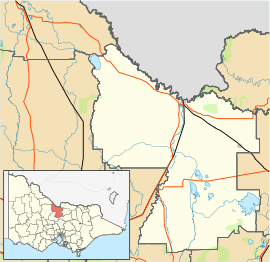Kyabram, Victoria
|
Kyabram Victoria |
|||||||
|---|---|---|---|---|---|---|---|

Allan Street, the main street of Kyabram
|
|||||||
| Coordinates | 36°19′0″S 145°03′0″E / 36.31667°S 145.05000°ECoordinates: 36°19′0″S 145°03′0″E / 36.31667°S 145.05000°E | ||||||
| Population | 7,321 (2011) | ||||||
| Established | 1876 | ||||||
| Postcode(s) | 3620 | ||||||
| Elevation | 104.5 m (343 ft) | ||||||
| Location |
|
||||||
| LGA(s) | Shire of Campaspe | ||||||
| State electorate(s) | Murray Plains | ||||||
| Federal Division(s) | Murray | ||||||
|
|||||||
Kyabram is located in the centre of a rich irrigation district in the Goulburn River Valley, 200 kilometres (120 mi) north of Melbourne, Victoria, Australia. Kyabram, the second largest town in the Shire of Campaspe. is situated between the towns of Echuca and Shepparton and is close to the Murray River, Goulburn River, Campaspe River and Waranga Basin. As of the 2011 census the town had a population of 7,321 people and provides services to a district population of around 16,000.
The name of the town is thought to derive from an Aboriginal word Kiambram meaning "Thick Forest".
The Bangerang people were the original inhabitants of the Goulburn valley.
The township started in the 1870s with the first sale of town blocks held in 1876. Kyabram Post Office opened on 23 September 1878. Sheridan Post Office opened on 1 December 1884. On 8 April 1886, in anticipation of the arrival of the railway at what was then Sheridan, Kyabram was renamed Kyabram East and Sheridan was renamed Kyabram. The Kyabram Mechanics' Institute was built in 1891.
John Allan, who lived in Kyabram from 1873, became Premier of Victoria in 1924 and Australia's first Country Party premier. Allan was associated with the Kyabram Reform Movement, a conservative political organisation formed at the start of the 20th century and led by Benjamin Goddard, a local businessman. The Movement's campaign played a significant role in the downfall of the Peacock state government in June 1902 and its sound defeat in the subsequent September elections. The incoming Irvine government substantially reduced the number of state parliamentarians, a key demand of the Movement.
...
Wikipedia

